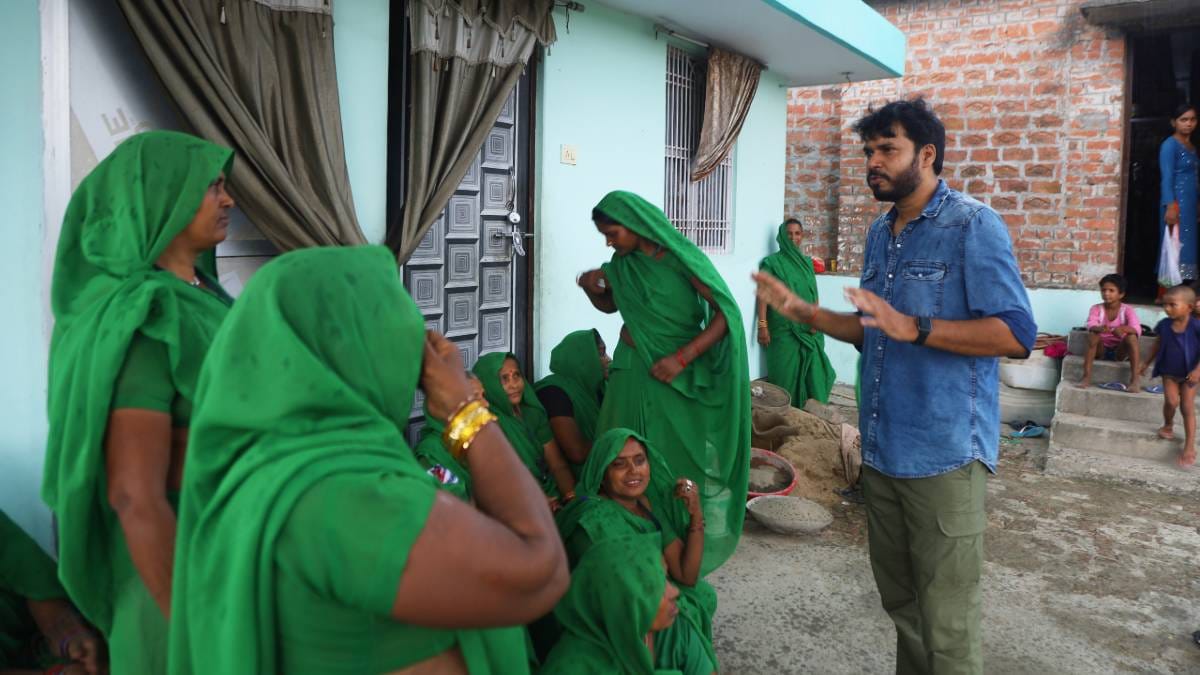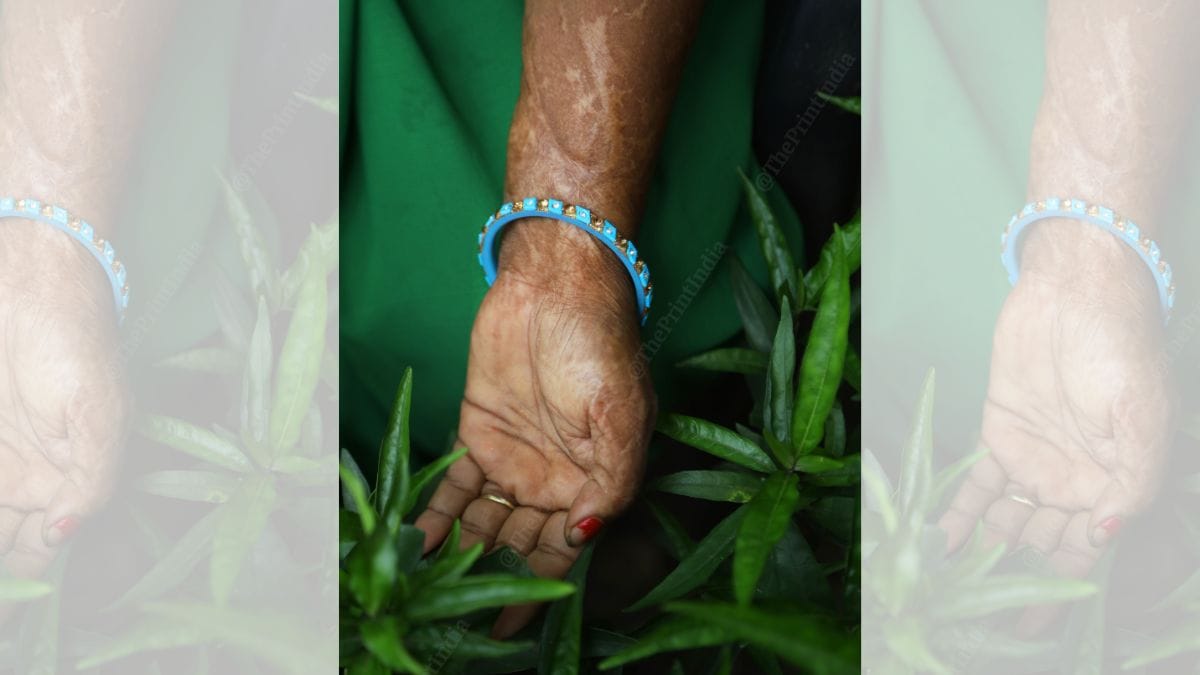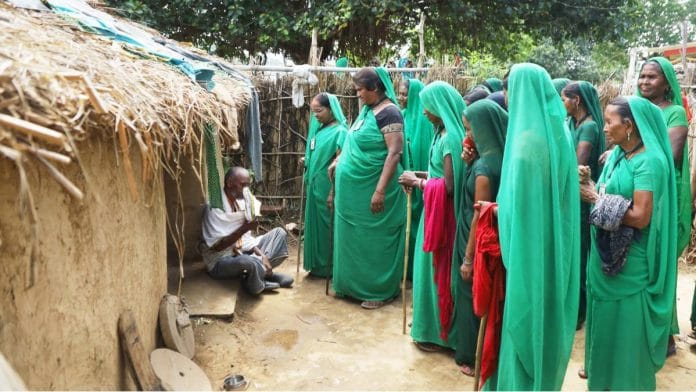Varanasi/Mirzapur: “Ghoonghat chhaati se sar tak aa gaya itne saalon mein — yeh bohot badi baat hai (it is a big deal that over the years, the veil has shortened from the chest to the head),” said Asha Devi, pointing to a group of women armed with sticks and demonstrating self-defence techniques in Kushiyari village in Uttar Pradesh’s Varanasi district.
She sits on a chair under a Mahua tree watching some others pluck guavas and grapes from her garden.
Accustomed to years of ghoonghat (veil), the group of women nearby, all clad in green sarees, keep fiddling with it even while in action. With no men around, some had allowed the ghoonghat to fall back off their heads, and pulled up their sarees along with their petticoats to beat the heat. However, at the sound of honking coming from the main road, there is a flurry of activity — ghoonghats were pulled back in place, sarees were pulled down and adjusted.
These women from Kushiyari — mostly Dalits, tribals and from Other Backward Castes — are all part of the Green Army that was formed in the village in 2014 by a former Banaras Hindu University (BHU) student, Ravi Mishra.
Its mission? To empower women from backward sections of society to come out of their abusive households and take a stand against oppression, and sexual and domestic violence. The Green Army has approximately 1,800 members now.
According to the women of the Green Army and Mishra, the initiative works mainly through counselling men, and occasionally using “sticks as weapons”. They added that over the years they have managed to bring down liquor and drug addictions in many villages of UP where they are now active.
“These women not only stop domestic abuse but also fight against the dowry system and superstitious rituals. They also work towards educating the girl child. Their job is not just to refine the men in their lives but also to improve the condition of their villages. We keep non-violence as our primary point of intervention,” said Mishra, who is also co-founder of the non-profit Hope Welfare Trust, under which the Green Army operates. His primary job is as a tuition teacher.

Asha Devi, who met Mishra in 2014 while he was visiting Kushiyari, said she was among the first few members of the Green Army.
Group members also insist that they have a different ideology and mode of operation than the more popular Gulabi Gang formed in 2006 in UP’s Banda district. The predominant narrative, however, remains the same — rise against oppression.
According to Mishra, unlike the Gulabi Gang, the Green Army isn’t “anti-men” and functions in compliance with local authorities.
“The sticks are not for hitting but for trust and support. When things go out of control, only then do these sticks come out as weapons,” he told ThePrint.
The women of the Green Army now have their eyes set on a new target — financial independence.
ThePrint travelled across villages in Varanasi and Mirzapur districts of UP tracking this group of women to understand their stories of struggle against patriarchy, the history of the Green Army, its way of operation and the changes it has brought to their lives so far.
Also Read: Can husband file domestic violence case against wife? Delhi HC to debate law ‘limited to women’
Asha Devi’s story
Married at the tender age of 14, Asha Devi, a Dalit woman and a mother of five, used to be beaten up daily by her husband.
Speaking to ThePrint, she said that the thrashings would not stop even when she was pregnant, and things only got worse when her children were growing up. “The number of mouths to feed increased and the beatings increased. Every day, my husband would get drunk and hurl abuses at me and beat me up,” she said. “There would be nights when I couldn’t sleep in pain. And if he saw me weeping, he would hit me again”.
She further said that on cold winter nights, her husband would throw her out of the house and she had to keep begging him to let her in. “I wished for death at that point,” she said, trying her best to hold back her tears.
Her burnt hands stand testimony to her years of torture. “One day I decided to end it all and set myself on fire. But I was saved,” she said.

The beatings finally stopped, she explained, when her children grew a bit older and her husband realised that she wasn’t alone anymore.
One day in 2014, Asha Devi bumped into Mishra while he was visiting Kushiyari with associates from Hope Welfare Trust to look into why children from the village were not going to school.
She ran to him, asking him to help her out. “I asked him how do you expect our kids to study when all they see is their alcoholic father beating up their mother every night and gambling in the day,” she told ThePrint. “It is then that Ravi asked me to bring other women who had been suffering just like me. So, we all came and sat under this Mahua tree telling him and the others our stories.”
According to Asha Devi, when she started attending the meetings of the Green Army, her husband would ridicule her.
“He would tell me that videos made by the brothers of the Green Army, of me sharing my story, would bring a bad name to the family. He also said my character was questionable,” she said.
But Asha Devi being part of the Green Army did have an effect on her husband. “My husband stopped drinking two months ago and he hasn’t touched me in the past eight years,” she told ThePrint.
Guddi’s story
In the tiny village of Jangal Mahal in UP’s Mirzapur district, Guddi, also from the Dalit community, sits cleaning her bamboo stick and narrates a tale of abuse similar to Asha Devi’s.
“I was married at the age of 13 and my husband started hitting me the day after our wedding. On most nights, he would keep me and the children hungry. He also threw me out of our house in front of the entire village,” she said, wiping tears from her face with the pallu of her green saree. “At some point, I made peace with it. I felt like I deserved it.”
Her husband, she told ThePrint, would be drunk through the day and night. “Even after the beatings, I had to sleep with him despite the pain in my body and cook meals for our family of five,” she added.
The Green Army was her saviour, she said. “One day, women from the Green Army came to our village. I started attending the meetings of the group and told the didis my story,” Guddi said.
In 2016, the Green Army barged into her house with sticks in their hands and threatened her husband. “Since then, he has stopped hitting me and stopped drinking and gambling as well. Today, both my daughters are studying — one is in school while the other is studying for a Bachelor’s degree. Both my sons also go to school,” she said.
Chantara’s story
Adjoining Kushiyari is another tiny village called Dewara — home to around 25 women of the Green Army.
Speaking to ThePrint, one of its residents, Chantara, explained how she, too, joined this army after suffering domestic violence.
“My husband would hit me on the head and pull my hair every night. I started losing my mind and wanted to kill myself but, thinking about my children, couldn’t,” she said.
Fed up of the constant abuse, in 2018 Chantara complained to the Green Army about her husband’s beatings.
She said that the women instructed her not to return home that night and visited her house the next day, taking her along. They then surrounded her husband and told him that if he kept hitting his wife, they would come back and thrash him.
“The didis told him that he was only one man and couldn’t fight all of us together. The repercussions would be terrible, they told him, and even broke his liquor bottles,” Chantara said. “He stopped hitting me from then on.”
Chantara has been a member of the Green Army ever since.
Police taboo & dependency
In Jangal Mahal, a woman named Sheela approached the Green Army unit, comprising around 40 women, seeking intervention. ThePrint witnessed how the women handled this case of domestic abuse.
Sheela said her husband was an alcoholic, so much so that he had even lost track of days and nights.
Led by their leader Malti, the women picked up their sticks and marched into Sheela’s tiny hut. They asked her husband, Shyam Lal, to sit down. “You have to stop doing this,” they told him, according to Sheela. “You know very well how we work. You married this woman and made her have children. Now, you get drunk and hit them. Next time we hear one single complaint from her, we won’t come here to just talk.”
One of the unit members, Suman, told ThePrint: “We don’t want to beat the men up. We want to explain things to them. There have been instances where we have gone to one house several times. In one case, the father-in-law used to hit the daughter-in-law every day. Even the husband couldn’t control him. We counselled him five times. At the sixth instance, we approached the police and they went with us.”

While the Green Army does take help from the police if required, the women said they don’t want to lodge complaints against their husbands. Their reasons for this range from social stigma and financial dependency to the hassle of courts.
According to Mishra, around 200 Green Army women have been given “police mitra (friend) ID cards” which makes it easy for them to approach the authorities. “In situations where things go out of hand, the women, armed with the ID cards, go to the local police and ask for assistance,” said Mishra.
When asked why the women do not leave their abusive husbands, Asha Devi said: “Where will we go if we leave them? We have no education.”
Women vigilantes
The concept of women coming together, armed with sticks, to fight unitedly against abusive men in their villages, and to curb alcohol and drug abuse, gambling addictions, isn’t new.
The Gulabi Gang was formed by Sampat Pal Devi for a similar purpose.
Speaking to ThePrint, Sampat Pal Devi said that at present her outfit had approximately 11 lakh members across India from the states of Haryana, Punjab, Rajasthan and Jharkhand, among others.
She added that it was her idea that had been used by others. “I started the initiative, and since then similar other outfits have been formed, like the Green Army and Belan Gang. The concept is the same. Women standing with women,” she explained.
However, there are some differences between the Green Army and Gulabi Gang.
Clad in pink sarees, members of the Gulabi Gang are referred to mostly as vigilantes as they prefer to resolve cases on their own, without police assistance. Meanwhile, Mishra emphasises that the Green Army “preferred non-violence” and was not averse to taking police aid.
“The Green Army believes in requests and verbal persuasion rather than hitting (abusive) men,” he said, reiterating that “we keep non-violence as our primary point of intervention and all that these women do otherwise falls under self-defence”.
Sampat Pal Devi, on the other hand, told ThePrint: “We all know what the police do. Hence, we don’t take any assistance from the authorities.”
Unlike the Gulabi Gang, the non-profit under which the Green Army operates is run by a team of seven trustees, who are all men, according to Mishra. Further, two-and-a-half months of training is provided to newly-inducted members.
Even at the cluster-village level, the women are trained and guided by male representatives, he said, adding that “the core Green Army team of 25 has only one woman”.
“Women students from BHU often visit the villages to speak to these women,” he said.
For the Gulabi Gang, said Sampat Pal Devi, one can reach out through a call or inform other gang members in their district or village.
For the Green Army, the number of members is limited to 25 in some villages and 42 in others, Vijay Kumar Singh, a school teacher and chief of the Mirzapur cluster, told ThePrint.
“We haven’t inducted too many women because of lack of funds. We also don’t want internal clashes and want them to remain united,” he explained.
Mumbai-based entrepreneur Neeti Goel had also stepped in and collaborated with Mishra and his team to help women fight for their rights.
“The ground team (of Green Army) saw how the men barely worked. Children and women didn’t have food. By giving them the green sarees and sticks, they were given an identity which is the first step in empowering them,” Goel told ThePrint.
In 2020 and 2021, the Covid-induced lockdown and subsequent unemployment only made things more difficult for such women in villages. “The men came back from the cities. Those here were out of jobs and were scrambling for alcohol. As always, women were at the receiving end of men’s frustrations,” said Dariya, a resident of Dewara village, adding that “things have got better now”.
‘Financial freedom’
Back in Kushiyari, where the Green Army was formulated, there is discontent — the women want financial independence.
Asha Devi tries to intervene but Mamata, Munni and some others from the unit refuse to listen.
“It has been years since we started serving for the betterment of society, but for how long? We want financial independence now. We want to work so that we can leave our abusive husbands. The men also taunt us asking ‘you hold meetings and threaten us, but what do you earn?’” said Mamata.
Asha Devi offers a different view. “They (Green Army) gave us ‘himmat’ (courage). Now it is for us to sustain the effort. It has taken years to step outside the walls of our homes and to bring the veil down. Change is slow but it is happening,” she said.
Another unit member, Munni Devi, interrupted her to say, “we have been fighting prolonged battles. Now the need is to have the choice not to fight them and to walk out”.
“How will that happen if we keep sharing our beds with men who used to hit us? Tomorrow if we aren’t united, what guarantee do we have that they won’t hit us again?” she asked.
Mishra told ThePrint that he has been working towards fulfilling their demand.
He explained that funds for his NGO mostly come from BHU professors and that he has started crowdfunding certain initiatives.
According to Mishra, in Dewara village, he has started a tiny chappal-making factory and plans to make it fully functional soon. A paper plate-making initiative has been started in Sonbhadra district of UP, and some women in Dewara have also been provided with thelas (carts) to sell fruits and vegetables.
(Edited by Nida Fatima Siddiqui)
Also Read: Pakistan’s tale of domestic abuse has new entry—actor Feroze Khan’s ex-wife gives proof






